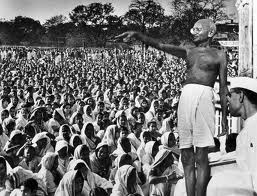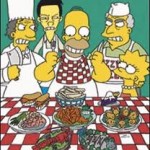
Fasting was integral to Ghandi’s philosophy and also used by him as an art of protest. My method is a more moderate approach.
Fasting has existed since biblical times and most likely before (I’m too lazy to do the research). Yet in today’s day and age the only time I hear mention of the practice is by Muslims during Ramadan. I am convinced that more fasting is happening in America, I just don’t happen to hear much of it. For this reason I’d like to share with you my own experimentation: The Mini-Fast.
What is the Mini-Fast*?
The biggest challenge I’ve had with a fast that lasts the entire day is that it’s difficult to predict what may occur when you go to work. What happens, for example, if you are asked out to lunch on the day you’ve chosen to fast? I could never muster the courage to explain that I was fasting. Or consider another likely scenario: what if there is some celebration and a delicious cake is brought into the office. Could I really turn down a free cake? The truth is, I couldn’t. This led me to devise the Mini-Fast*.
The Mini-Fast involves eating a vegetarian diet throughout the day. I try to eat only fruit, vegetables, and nuts; no snacks, cookies or anything on the heavy side. I time my last meal with the sun going down and then don’t eat anything until the following morning. It’s essentially having a healthy day of eating and skipping dinner. The last item I will eat is normally something that I’ve found to be healthy but filling: a hard boiled egg, orange, or a glass of 2% milk.
Mini-Fast Observations

I’ve found a single hard boiled egg to be effective in getting you over the stretch when attempting the Mini-Fast.
Having successfully pulled off a Mini-Fast on numerous occasions, I’m happy to report my observations:
* It is best to plan out a quiet evening. Going out drinking doesn’t count in my book and you’ll most likely have an awful hangover the next morning due to an empty stomach. Tuesday or Monday nights work best for me. Normally I spend my Mini-Fast in solitude either reading or watching a movie.
* When I do the Mini-Fast I tend to get tired more easily than if I had eaten a meal. This sounds counter intuitive, I know.
* Coffee is a good way to keep your appetite down during the day but don’t drink it too late or you may have trouble falling asleep. This sounds like common sense but when you drink coffee on an empty stomach, the effects of caffeine will be a bit stronger than usual.
* The most rewarding part of the Mini-Fast for me is that I have the most vivid dreams when I go to sleep that night. On a normal night, I am only able to recall certain blurry portions of my dreams and tend to forget most of it or nearly all after I awake. This is not the case when I have a Mini-Fast. When I awake it often feels like the credits rolling on the silver screen, my mind still caught in the dream.
* Hunger comes in waves and the first Mini-Fast is always the toughest. You will think about food a lot more than you normally do, almost fantasize about it. You have to fight it as best as you can and don’t give in. Eventually your body will stop sending the “feed me” signal. From experience, the longest I’ve ever had to fight with hunger pains has been 45 minutes.
* Surprisingly, the next morning I wake up not feeling hungry at all although a bit weaker than normal.
What Not To Do – Common Mistakes Made When Intermittent Fasting

Gorging yourself the day after a Mini-Fast tends to negate the weight loss results achieved from the previous day’s fast and is not recommended.
* Having a binge the following day accomplishes nothing. The Mini-Fast is not comfortable so the last thing you want to do is go through all that sacrifice for nought. I will generally have a larger breakfast than normal but the rest of the day is business as usual.
* If you are a beginner, I highly suggest doing no more than one Mini-Fast per week. In my opinion, your body won’t be used to such an extreme change. You’ll end up feeling dizzy and light-headed throughout the day which is dangerous.
* Each person’s body is different. If you are feeling weak and simply cannot go through with it, don’t feel like a complete failure. As mentioned, the initial fast is the most difficult because your body isn’t used to it so you may simply need to work up to it, or try fasting on a different set of hours that are more comfortable for you.
Final Thoughts About The Mini-Fast & Intermittent Fasting
I advocate the Mini-Fast for a variety of reasons. First, one of the realizations I had after fasting a couple of times is that my body did not require as much food as I thought it needed to get me going throughout the day. Granted, I did feel weak after my first Mini-Fast but that is only because it was a shock to the system. We’ve no doubt read about the marvelous capabilities of the body but actually going through the motions provides an education that a book simply cannot provide.
Secondly, when used in moderation, a Mini-Fast is an effective way–not a silver bullet of course–to lose weight. I would suggest combining this with exercise and a healthy diet for maximum results. Just remember that after a Mini-Fast your stomach has shrunken a tiny bit. If you do a Mini-Fast once per a week, or even every other week, you will soon realize, as I did during my own experience with the Mini-Fast, that your body needs far less food than you might think to get through the day.
Finally, while I haven’t done the research to back this up, I feel that occasionally giving your body a break in terms of food intake should help extend life. I equate the body to a machine. If you are constantly using it, day in and out, it will most likely break down more quickly than a machine that takes some time off from operating. It’s a controversial opinion, but perhaps simply believing that by fasting you are somehow extending your life will be the necessary placebo effect for it to actually work 🙂
Leave a Reply